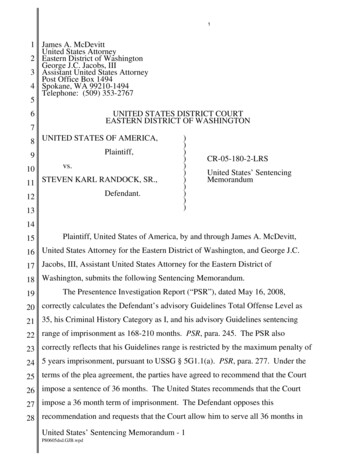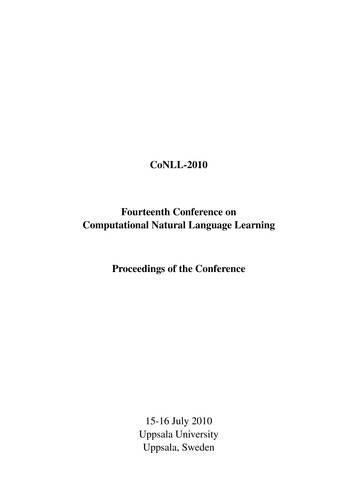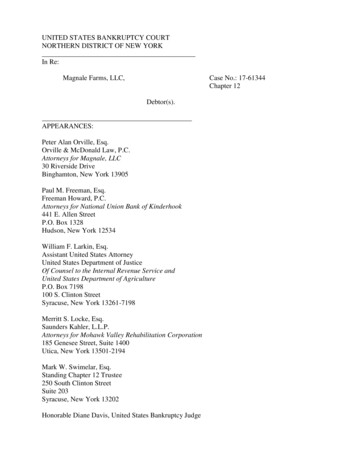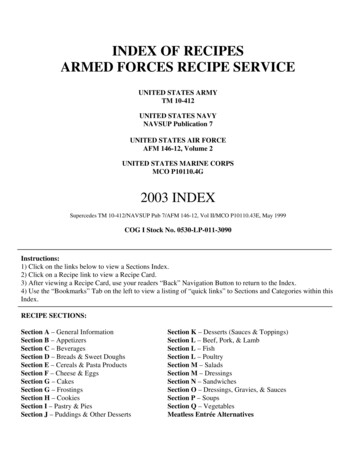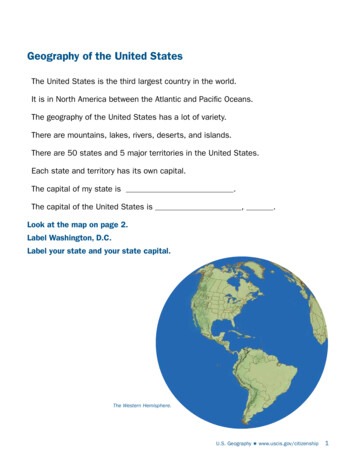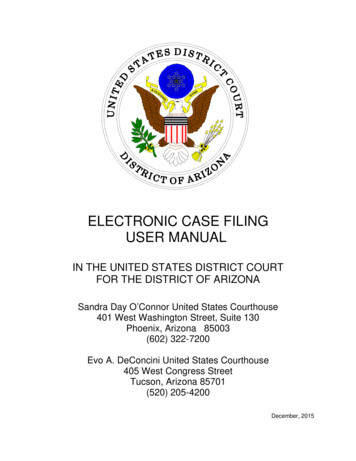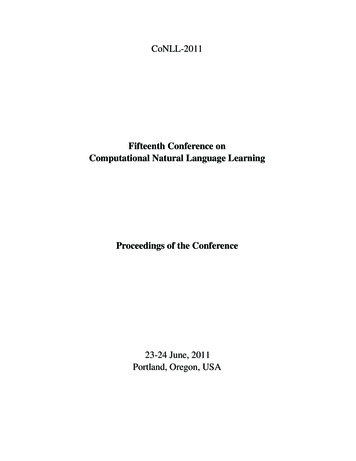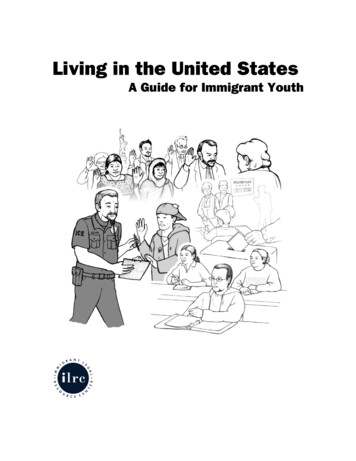
Transcription
Living in the United StatesA Guide for Immigrant Youth
Table of ContentsIntroduction . 3Do You Know Your Immigration Status? . 410 Things Every Undocumented Youth Should Know . 711 Things Every Youth with a Green Card Should Know . 8U.S. Citizenship . 10How to Get a Green Card (If You Are Undocumented) . 12DACA (Deferred Action for Childhood Arrivals). 14DAPA (Deferred Action for Parents of Americans and LawfulPermanent Residents). 16Involvement with Gangs . 18Watch Out for Immigration Scams! . 19Deportation and Other Immigration Problems. 20Know Your Rights . 21Adoption and Your Immigration Status . 23Helping Family Members Get Immigration Status or Cometo the United States . 25Immigrants and the U.S. Military. 26Voting . 28Social Security Numbers . 30Working in the United States . 31Paying Taxes. 33Receiving Public Benefits. 35Getting an ID . 37Getting a Driver’s License . 38Going to College . 39Banking and Credit Cards . 41PAGE 2IMMIGRANT LEGAL RESOURCE CENTER 2015
IntroductionImmigration issues are tricky. There are many ways in which your immigrationstatus—whether you’re a green card holder or undocumented—can impact yourability to get a job, go to college, or even remain in the United States. That’s why wecreated this resource especially for immigrant youth. We hope you find it useful.About the Immigrant Legal Resource Center (ILRC)The Immigrant Legal Resource Center (ILRC) is a nonprofit organization in SanFrancisco that provides trainings, materials and advocacy to advance immigrantrights. The ILRC works with immigrants and citizens to make critical legal assistanceand social services accessible to all, regardless of income, and to build a society thatvalues diversity and respects the dignity and rights of all people. Find us on the webat www.ilrc.org.A big thank you to the following people for making this book possible: Angie Junck,Alison Kamhi, Rachel Prandini, and Sally Kinoshita at the Immigrant Legal ResourceCenter, Barbara Pinto, Hayley Upshaw, Jay Martin Steinman, Sotivear Sim, JennyCohen, Tanya Broder, Christine Wong Yap, and especially to the youth at LegalServices for Children and the San Francisco Independent Living Skills Program.This updated resource was made possible through funding fromthe Walter S. Johnson FoundationIllustrations by Christine Wong Yap2015IMMIGRANT LEGAL RESOURCE CENTER 2015PAGE 3
Do You Know Your Immigration Status?Most people fall into one of three categories: U.S. citizens, green card holders, orundocumented. There are also other categories, like refugees, TPS, and U Visaholders. Many youth may also be eligible for deferred action status through DACA orDAPA. See the next page for information on those.People with green cards are often called “LPRs” (legal permanent residents).For information on getting a green card, see the section “How to get a green card.”For information on being a U.S. citizen, see the section “U.S. Citizenship.”U.S. CitizenGreen DocumentU.S.passportor birthcertificateGreen card(the color isnot actuallygreen)Work permit,SocialSecurity CardNo U.S. papersCan You BeDeported?NoYes, if youbreakcertain lawsor do otherthings thatwould allowa judge todeport youYes, if thegovernmentdecides to nolonger allowyou toremain in theU.S.Yes, at any timeCan YouLegallyWork?YesYesYesNoCan YouVote?YesNoNoNoDo YouHave theRight toEducation?YesYesYes (but youcan’t get in‐state collegetuition inmany states.You can in CAunderAB540.)Yes (but youcan’t get in‐state collegetuition in manystates. You canin CA underAB540.)PAGE 4IMMIGRANT LEGAL RESOURCE CENTER 2015
Can YouGet FederalFinancialAid forCollege?YesYesNo (but in CA,you canobtain stateaid under theCA DreamAct)No (but in CA,you can obtainstate aid underthe CA DreamAct)Can YouGet aDriver’sLicense?YesYesYes for DACA.Probably yesfor DAPA.Depends on thestate (in CA,you can underAB60).Can YouGet a SocialSecurityNumber?YesYesYesNoCan YouHelpFamilyMembersImmigrate/GetPapers?YesYes, butwithrestrictions(you canhelp fewerpeople, andthe waitsare longerthancitizens)NoNoCan YouTraveloutside theU.S.?Yes—norestrictionsYes, but notfor longperiodsYes, but onlywith a specialpermit youhave toobtain inadvanceIf you leave,you can’tlegally returnOther Immigration CategoriesSpecial Immigrant Juvenile Status (SIJS): Allows you to stay in the country, work,and get a green card. You must be separated from one or both of your parents due toproblems at home. If you have been abandoned, abused or neglected by one or bothof your parents and are undocumented, you should try to apply for this.Deferred Action for Childhood Arrivals (DACA) and Deferred Action forParents of Americans and Lawful Permanent Residents (DAPA): Althoughdeferred action does not give you the right to stay in the U.S. permanently, likehaving a green card, DACA or DAPA will temporarily protect you from beingdeported and allow you to work in the U.S. See the sections entitled “DeferredIMMIGRANT LEGAL RESOURCE CENTER 2015PAGE 5
Action for Childhood Arrivals” and “Deferred Action for Parents of Americans andLawful Permanent Residents” for more information.Refugee/Asylee: In your home country, you were threatened or face future threatsdue to your or your family’s religion, political views, race, etc. You can live and workin the U.S and get a green card.Temporary Protected Status: You do not have papers, but because of problems inyour home country (a civil war, earthquake, etc.) the U.S. government allows you tostay until the danger has passed.U or T Visa: You have been the victim of a crime in the U.S. or trafficking. You canlive and work in the U.S. and get a green card (eventually).PAGE 6IMMIGRANT LEGAL RESOURCE CENTER 2015
10 Things Every Undocumented Youth Should KnowIf you do not have legal immigration status in the United States, you are at risk. Keepthese points in mind:1. If approached by immigration authorities, do not sign any papers and donot talk to them unless you check with a lawyer first.2. Stay out of trouble with the law. In most, if not all places, police and other lawenforcement will share your fingerprints with immigration authorities. In someplaces, police may even hand your name or other personal information over toimmigration authorities. If you commit a crime, it will make it harder to get legalstatus in the future.3. If you are charged with a crime, make sure your lawyer (whether privateor a public defender) knows your immigration status. Your lawyer isrequired under the Constitution to inform you of the way your criminal case willaffect your immigration case. Letting them know your immigration status willallow them to best help you.4. Don’t cross the border. Once you leave the country, you can’t legally re‐enterthe U.S.5. If you are working illegally, you should still pay taxes. This will improve yourchances of getting legal papers in the future.6. If you’re male, register for the “Selective Service” when you turn 18. Theimmigration authorities will NOT see your information. Like paying taxes, thiswill make it easier to get legal papers in the future.7. If at all possible, try to become a legal resident. See the section entitled “Howto get a green card.”8. Having a child will not help you become legal. A child can only help his or herparent get a green card if the child is over 21 years old. (Although having a childmay help someone qualify for DAPA, DAPA is not a green card, and it is only forpeople who had U.S. citizen children on or before November 20, 2014. Seesection entitled “Deferred Action for Parents of Americans and LawfulPermanent Residents”).9. Do not lie (to a person or on a form) and say you are a U.S. citizen when youare not. A false claim to citizenship is taken seriously by the government andcould hurt your chances of ever getting a green card or get you deported.10. Do not lie about your age. People under 18 are entitled to certain protectionsin immigration law, and if you are under 18, you should say so.IMMIGRANT LEGAL RESOURCE CENTER 2015PAGE 7
11 Things Every Youth with a Green Card Should KnowA green card gives you many rights, but you still have to be careful. Note thesepoints:1. Stay out of trouble with the law. Some offenses, even minor ones, can lead toyou being deported.2. If you are charged with a crime, make sure your lawyer (whether privateor a public defender) knows your immigration status. Your lawyer isrequired under the Constitution to inform you how your criminal case will affectyour immigration situation. Letting them know your immigration status willallow them to best help you.3. If you change your address, tell the immigration authorities immediately.You need to do this within 10 days of the move. Go to www.uscis.gov, click on“Tools” and then click on “Change your Address on File.”4. You need to get a newgreen card every 10years. Your statusdoesn’t expire, you willjust need to replace thecard. Look at your greencard to find itsexpiration date.5. If approached byimmigrationauthorities, do notsign any papers anddo not talk to themunless you check with alawyer first.6. To travel outside theUnited States, youneed a passport fromyour home country. If you later become a U.S. citizen, you can use a U.S.passport.7. Don’t leave the country for long periods. If you are gone for six months orlonger, you might have complications coming back to the U.S., and if it’s morethan a year you might not be able to re‐enter the United States. If you have aPAGE 8IMMIGRANT LEGAL RESOURCE CENTER 2015
good reason to be gone for a long time, you can ask for permission, but you needto do this before the trip, if possible.8. If you’re male, register for the “Selective Service” when you turn 18. Thiswill make it possible for you to receive certain benefits, and apply for U.S.citizenship.9. If you are working, pay taxes if you owe them. This will keep you out of legaltrouble and allow you to become a U.S. citizen later. For more information, seethe section entitled “Taxes.”10. Apply for U.S. citizenship when you are eligible or encourage a parent who youlive with to apply for citizenship before you turn 18 so that you canautomatically become a citizen without having to apply later. For moreinformation on why and how, see the section entitled “U.S Citizenship.”11. Do not lie (to a person or on a form) and say you are a U.S. citizen when youare not. A false claim to citizenship is taken seriously by the government andcould hurt your chances of ever getting a green card or get you deported.IMMIGRANT LEGAL RESOURCE CENTER 2015PAGE 9
U.S. CitizenshipIt’s a very good idea to apply for U.S. Citizenship. Once you become a U.S. Citizen,you: Can’t be deported. (If you have a green card, you can still be deported if youhave problems with the law.)Can more easily and quickly help family members come to the United States.Can get government jobs, and can more easily receive government benefits.Can vote!Are you already a U.S. Citizen? Some people are citizens but don’t realize it. If you were born in the United States, you are automatically a U.S. citizen.If you were born in another country, but one of your parents was a U.S.citizen, you may be a U.S. citizen.If your parent became a U.S. citizen, and at the time you were under 18 andhad a green card, you are probably a U.S. citizen.If you are not sure, talk to a lawyer. The laws for this are complicated.Note: Having a Green Card Does Not Make You a U.S. Citizen!One of the most common ways to become a citizen for people who were not born inthe U.S. is to naturalize. To apply to become a U.S. Citizen through naturalization,you need to: PAGE 10Be at least 18 years old.Have a green card for 5 years (less if you marry a U.S. citizen or join themilitary).Have lived in the United States for the past 5 years (3 years if you aremarried to a U.S. citizen).Pay all your taxes and child support, if you owe them.IMMIGRANT LEGAL RESOURCE CENTER 2015
Stay out of trouble with the law. (Minor crimes may not be a problem; talk toa lawyer.)Register for selective service when you are 18. (Males only.) If you are over18, do it now! It will save you problems later. For more information, see thepage entitled “Immigrants and the U.S. Military.”Send an application and fee to the U.S. Citizenship & Immigration Services,attend an interview, pass an English and civics test, and take an oath ofallegiance to the United States.WARNING: When you apply for citizenship, you are inviting the government toreview all of your records. This could lead them to find something that makes youdeportable, such as having committed a crime, lied to the government, etc. Talk to alawyer first to make sure everything is okay.IMMIGRANT LEGAL RESOURCE CENTER 2015PAGE 11
How to Get a Green Card (If You Are Undocumented)Don’t wait! Talk to an immigration lawyer to figure out what your options are. Thelaws are complicated, and it’s important to find a lawyer who has experience in thisarea.If you are in foster care, in juvenile hall or under juvenile probation, or arebefore another state juvenile or family court: Ask your social worker, probationofficer, and/or lawyer about getting Special Immigrant Juvenile Status (SIJS). Thisprotects you from deportation, allows you to work, and makes it possible to get agreen card. To see if you are eligible, ask your social worker, probation officer,and/or a lawyer. If you have a lawyer who doesn’t know immigration law, ask yourlawyer to get help from a lawyer who does.To Be Eligible for SIJS: You must be under 21 years old and unmarried. (You can have kids of yourown.)You also need to have or open a case in state court where the judge findsthat:o You aren’t able to be reunited with one or both of your parents because ofproblems at home (abuse, neglect, or abandonment).o It’s not in your best interest to go back to your home country.Note:o If you are adopted, or live with other family members, it may still bepossible to get SIJS.o If you get SIJS, you cannot help your parents get immigration status orcome to the United States later.Note that you can hurt your chances of getting a green card through SIJS if youcommit crimes or lie about your immigration status.If a family member is aU.S. citizen or has a greencard: The relative might beable to help you get yourpapers. If the relative has agreen card, the relativemust be your husband,wife, or parent. If you arein a valid same‐sexmarriage with a U.S. citizenor lawful permanentresident, your spouse mayalso be able to help you geta green card. If the relativePAGE 12IMMIGRANT LEGAL RESOURCE CENTER 2015
is a U.S. citizen, he or she can be your husband, wife, parent, or also your brother orsister (as long as the person is over 21). A child can only help a parent immigrate ifthe child is over 21. Note that aunts, uncles, cousins, and other family members can’thelp you immigrate unless they have formally adopted you.If you come from an abusive household: You may have options under theViolence Against Women Act (VAWA). This law helps you if your parent, husband, orwife is a U.S. citizen or a green card holder, but that person won’t help you get yourimmigration papers. If eligible, you can obtain papers without going through yourabusive parent or spouse. Even if your parent was abused and you were not, youmay still be able to get your immigration papers. You have to have lived with theabusive parent or spouse at some point, and if the abusive person is your parent,you have to be under 25 years old. The abuse does not have to be physical (it can beverbal or emotional).If you have been the victim of a crime: You may be eligible for a T visa or U visa,and then after a few years for a green card. The T visa is for people who have beentrafficked—which usually means being forced to work, such as labor or sex work. Ifyou are under age 18, you can qualify for a T visa based on sex trafficking even if youweren’t forced to do the sex work. The U visa is for people that have been a victim ofa serious crime in the U.S., such as domestic violence, abuse, physical attack, rape,kidnapping, etc. You have to help the police investigate the crime.Through an employer: An employer can also petition for an employee to receive aworker’s visa and a green card. Talk to an attorney before approaching youremployer.IMMIGRANT LEGAL RESOURCE CENTER 2015PAGE 13
DACA (Deferred Action for Childhood Arrivals)What Is DACA and What Are the Benefits?DACA is a program that protects eligible undocumented youth from being deported.DACA protects the youth for two years, but it can be renewed. If you are eligible forDACA, you can apply to legally work in the United States and apply for a valid socialsecurity number.A youth who has obtained DACA can also travel outside of the United States, but onlywith a special permit (called “Advance Parole”) and only for certain reasons. Leavingthe United States without first receiving Advance Parole will automaticallyterminate DACA. Be sure to check with an attorney before leaving the United States.Who Is Eligible for DACA?An undocumented youth that is currently living in the United States may be eligiblefor DACA. The youth can request DACA even if immigration is currently trying todeport him or her or, in some cases, even if he or she was already ordered deportedor removed. If the youth is detained by immigration authorities, he or she can ask tobe released based on DACA eligibility, and then apply for DACA.On November 20, 2014, President Obama announced changes to some of the DACArequirements that will allow more undocumented youth to qualify for the program.PAGE 14IMMIGRANT LEGAL RESOURCE CENTER 2015
A youth can request DACA now if he or she: Is at least 15 years old at the time of filing his or her request (unless he or shehas a case in immigration court, a final order of deportation, or a voluntarydeparture order);Was under the age of 31 as of June 15, 2012 (born after June 15, 1981);Came to the United States before his or her 16th birthday;Has continuously resided in the United States since June 15, 2007, up to thepresent time;Was physically present in the United States on June 15, 2012, and at the timeof making his or her request for DACA;Was undocumented on June 15, 2012;Is currently in school, has graduated or obtained a certificate of completionfrom high school, has obtained a general education development (GED)certificate, or is an honorably discharged veteran of the Coast Guard orArmed Forces of the United States; andHas not been convicted (as an adult) of a felony, significant misdemeanor,three or more other misdemeanors, and does not otherwise pose a threat tonational security or public safety.There were two main changes announced to DACA on November 20, 2014. The firsteliminates the “age cap” that required undocumented youth to have been born afterJune 15, 1981. This means that undocumented youth cannot be “too old” to requestDACA, as long as they meet all the other requirements. The second change allowspeople to apply for DACA who have been here since January 1, 2010 (instead of June15, 2007). These changes are currently blocked because of an ongoing court case.IMMIGRANT LEGAL RESOURCE CENTER 2015PAGE 15
DAPA (Deferred Action for Parents of Americans and LawfulPermanent Residents)What Is DAPA and What Are the Benefits?DAPA, also called “Deferred Action for Parents of Americans and Lawful PermanentResidents” is a new program announced by President Obama on November 20,2014. DAPA protects certain undocumented people from deportation for three yearswho are parents of U.S. citizens or lawful permanent residents. If you are eligible forDAPA, you can apply to legally work in the United States and apply for a valid socialsecurity number.Who Is Eligible for DAPA?Undocumented immigrants who are parents of U.S. citizens or lawful permanentresidents (green card holders) and have been living in the United States sinceJanuary 1, 2010, may be eligible for DAPA. An undocumented immigrant can requestprotection from deportation based on his or her eligibility for DAPA even ifimmigration is currently trying to deport him or her or, in some cases, even if he orshe was already ordered deported or removed. If the person is detained byimmigration authorities, he or she can ask to be released based on DAPA eligibility,and then apply for DAPA.PAGE 16IMMIGRANT LEGAL RESOURCE CENTER 2015
A person can request DAPA if he or she:1. Is the parent of a U.S. citizen or lawful permanent resident (green cardholder), as of November 20, 2014;a. The son or daughter can be any age, married or unmarried, but musthave been born on or before November 20, 2014.2. Has lived continuously in the United States since January 1, 2010;3. Was undocumented on November 20, 2014;4. Was physically present in the United States on November 20, 2014, and onthe date he or she requests DAPA; and5. Is not considered a priority for immigration enforcement, which means: notconvicted (as an adult) of an aggravated felony, a felony, a significantmisdemeanor, or three or more other misdemeanors; does not have certainconvictions or associations to gangs; does not otherwise pose a threat tonational security or public safety; is not a significant visa abuser; is not arecent unlawful border crosser; and does not have a deportation orderissued on or after January 1, 2014.You cannot apply for DAPA yet. The program is currently blocked by anongoing court case.To stay informed about this program and the application process, visit:www.uscis.gov/immigrationaction. You can also sign up to receive updates by emailat: ubscriber/new?topic id USDHSCIS 74.Warning! Once you have been granted DACA or DAPA, immigration authorities cantake it away if you commit or are found guilty of certain crimes. For example, anadult conviction for a DUI (driving under the influence) or a felony will not allowyou to receive DACA or DAPA, and may also cause you to lose DACA or DAPA. Insome cases, you may be taken into custody by immigration authorities if you areconvicted after you receive DACA or DAPA.IMMIGRANT LEGAL RESOURCE CENTER 2015PAGE 17
Involvement with GangsWarning! Make sure to talk to an attorney before you apply for any immigrationbenefit if you think someone such as a school official or police might have put you ona gang list or database for being involved with a gang or for associating with gangmembers. Some youth are put on a gang list by mistake or even for hanging out withpossible gang members. You can be targeted by immigration officials for simplyassociating with friends or family members that are in a gang. Make sure to talk toan attorney if you have ever been involved in or had ties to a gang, because filing forimmigration papers may be risky.When you talk to an attorney make sure to mention if you: Were ever accused of being in a gang or questioned about being part of agang by police, school staff, immigration, or anyone elseWere put on a gang list (e.g. by school, the county, police department, etc.) orare named in a gang injunctionLive in a neighborhood that has a lot of gang activity or have closefriends/family members that are part of a gangTold immigration officials or police that you are part of a gangWere or are involved in any way with a gangWere ever arrested, jailed, or appeared in front of a judge in courtHad or have any gang‐related tattoosEver posted anything on social media (e.g. Facebook, Twitter, Instagram, etc.)related to gangsIn addition to hurting your immigration case, gangs can be very dangerous, violent,and carry great consequences for youth that are involved. Gang members risk injuryfrom rival gangs, injury to family members, and even death. Being involved in a gangcan also lead to criminal consequences. There are laws that provide for strictpenalties for gang‐related offenses. Some include larger fines and even longersentences—15 years or more for gang‐related gun crimes, drug sales, and violence.If you or a friend is involved in a gang, getting out is not impossible. There are thingsyou can do and organizations that can help you get out of a gang. Call the Hopeline(800‐442‐HOPE): it’s open 24 hours a day, seven days a week, and the hotline haspeople that can speak with you about your situation and help you find localresources to help you leave a gang.PAGE 18IMMIGRANT LEGAL RESOURCE CENTER 2015
Watch Out for Immigration Scams!Not everyone who offers immigration services is honest, and you should only go to alegal services provider that you can trust. Choosing someone to help you and yourfamily with immigration papers is a very important decision, and like all importantdecisions you have to be careful to choose wisely. Don’t be fooled by false promises.You could lose your money and potentially be deported from the United States.There are many different tricks that dishonest immigration consultants, notarios,and some lawyers use to make people believe they will get green cards. Forexample, they may tell you: I offer “no risk” immigration.I can get U.S. visas for you and your family in a few weeks.I can get you a work permit right away.I know people at immigration and can get your papers done quickly.These are lies! Don’t trust your immigration situation to anyone who tells youany of these things!A notario is not an attorney in the United States, and is not permitted to giveimmigration advice! Only 2 kinds of people are authorized by the U.S.government to give you immigration advice. Attorneys licensed by a state bar, andCertain people who work for nonprofit organizations and have beenauthorized to represent people before the immigration authorities (oftencalled “BIA Accredited Representatives”).Things You Can Do to Protect Yourself from Immigration Scams Never sign any blank application papers.Never sign any paper, contract, or immigration form that you do notcompletely understand. (Get someone you trust to translate it for you.)Always demand a written contract for any immigration services when youare not working with a recognized agency.Make sure that you know how much your case will cost from the verybeginning.Watch out for anyone who wants you to pay immediately.Always get copies of the papers prepared for you.Never let anyone keep your original documents (example: birth certificates).Get a receipt for any money you pay. (Make sure it has the amount paid, thedate paid, your name, and the name of the person or business that you paid.)Never work with someone who will not answer your questions, explainthings to you, or return your calls. Make sure you understand what must bedone, and why, before you go ahead.Get a second opinion if you’re not sure!IMMIGRANT LEGAL RESOURCE CENTER 2015PAGE 19
Deportation and Other Immigration ProblemsWhen the U.S. government kicks someone out of the United States and forces themto go back to their home country, this is called deportation or removal.Who Can Be Deported?Anyone who is not a U.S. citizen can be deported!This means even people with green cards who havebeen here since they were babies can be deported. Itdoes not matter if you have lived here your wholelife or you cannot speak the language of your homecountry or you do not know anyone in your homecountry—if you are not a U.S. citizen, you can bedeported.Why Do People Ge
A Guide for Immigrant Youth . PAGE 2 IMMIGRANT LEGAL RESOURCE CENTER 2015 . The Immigrant Legal Resource Center (ILRC) is a nonprofit organization in San Francisco that provides trainings, materials and advocacy to advance immigrant rights. The ILRC works with immigrants and citizens to make critical legal



